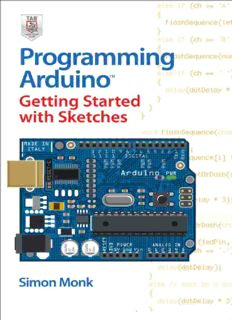Table Of Content™
Programming Arduino
Getting Started with Sketches
Simon Monk
Copyright © 2012 by The McGraw-Hill Companies. All rights reserved. Except as
permitted under the United States Copyright Act of 1976, no part of this publication may
be reproduced or distributed in any form or by any means, or stored in a database or
retrieval system, without the prior written permission of the publisher.
ISBN: 978-0-07-178423-8
MHID: 0-07-178423-3
The material in this eBook also appears in the print version of this title: ISBN: 978-0-07-
178422-1, MHID: 0-07-178422-5.
All trademarks are trademarks of their respective owners. Rather than put a trademark
symbol after every occurrence of a trademarked name, we use names in an editorial
fashion only, and to the benefit of the trademark owner, with no intention of infringement
of the trademark. Where such designations appear in this book, they have been printed
with initial caps.
McGraw-Hill eBooks are available at special quantity discounts to use as premiums and
sales promotions, or for use in corporate training programs. To contact a representative
please e-mail us at bulksales@mcgraw-hill.com.
All trademarks or copyrights mentioned herein are the possession of their respec-tive
owners and McGraw-Hill makes no claim of ownership by the mention of products that
contain these marks.
“Arduino” is a trademark of the Arduino team.
Information has been obtained by McGraw-Hill from sources believed to be reliable.
However, because of the possibility of human or mechanical error by our sources,
McGraw-Hill, or others, McGraw-Hill does not guarantee the accuracy, adequacy, or
completeness of any information and is not responsible for any errors or omissions or the
results obtained from the use of such information.
TERMS OF USE
This is a copyrighted work and The McGraw-Hill Companies, Inc. (“McGraw-Hill”) and
its licensors reserve all rights in and to the work. Use of this work is subject to these
terms. Except as permitted under the Copyright Act of 1976 and the right to store and
retrieve one copy of the work, you may not decompile, disassemble, reverse engineer,
reproduce, modify, create derivative works based upon, transmit, distribute, disseminate,
sell, publish or sublicense the work or any part of it without McGraw-Hill’s prior consent.
You may use the work for your own noncommercial and personal use; any other use of the
work is strictly prohibited. Your right to use the work may be terminated if you fail to
comply with these terms.
THE WORK IS PROVIDED “AS IS.” McGRAW-HILL AND ITS LICENSORS MAKE
NO GUARANTEES OR WARRANTIES AS TO THE ACCURACY, ADEQUACY OR
COMPLETENESS OF OR RESULTS TO BE OBTAINED FROM USING THE WORK,
INCLUDING ANY INFORMATION THAT CAN BE ACCESSED THROUGH THE
WORK VIA HYPERLINK OR OTHERWISE, AND EXPRESSLY DISCLAIM ANY
WARRANTY, EXPRESS OR IMPLIED, INCLUDING BUT NOT LIMITED TO
IMPLIED WARRANTIES OF MERCHANTABILITY OR FITNESS FOR A
PARTICULAR PURPOSE. McGraw-Hill and its licensors do not warrant or guarantee
that the functions contained in the work will meet your requirements or that its operation
will be uninterrupted or error free. Neither McGraw-Hill nor its licensors shall be liable to
you or anyone else for any inaccuracy, error or omission, regardless of cause, in the work
or for any damages resulting therefrom. McGraw-Hill has no responsibility for the content
of any information accessed through the work. Under no circumstances shall McGraw-
Hill and/or its licensors be liable for any indirect, incidental, special, punitive,
consequential or similar damages that result from the use of or inability to use the work,
even if any of them has been advised of the possibility of such damages. This limitation of
liability shall apply to any claim or cause whatsoever whether such claim or cause arises
in contract, tort or otherwise.
To my boys, Stephen and Matthew,
from a very proud Dad.
About the Author
Simon Monk has a bachelor’s degree in cybernetics and computer science and a doctorate
in software engineering. He has been an active electronics hobbyist since his school days
and is an occasional author in hobby electronics magazines. He is also author of 30
Arduino Projects for the Evil Genius and 15 Dangerously Mad Projects for the Evil
Genius.
CONTENTS
Acknowledgments
Introduction
1 This Is Arduino
Microcontrollers
Development Boards
A Tour of an Arduino Board
Power Supply
Power Connections
Analog Inputs
Digital Connections
Microcontroller
Other Components
The Origins of Arduino
The Arduino Family
Uno, Duemilanove, and Diecimila
Mega
Nano
Bluetooth
Lilypad
Other “Official” Boards
Arduino Clones and Variants
Conclusion
2 Getting Started
Powering Up
Installing the Software
Uploading Your First Sketch
The Arduino Application
Conclusion
3 C Language Basics
Programming
What Is a Programming Language?
Blink—Again!
Variables
Experiments in C
Numeric Variables and Arithmetic
Commands
if
for
while
The #define Directive
Conclusion
4 Functions
What Is a Function?
Parameters
Global, Local, and Static Variables
Return Values
Other Variable Types
floats
boolean
Other Data Types
Coding Style
Indentation
Opening Braces
Whitespace
Comments
Conclusion
5 Arrays and Strings
Arrays
Morse Code SOS Using Arrays
String Arrays
String Literals
Description:Clear, easy-to-follow examples show you how to program Arduino with ease! "Programming Arduino: Getting Started with Sketches" helps you understand the software side of Arduino and explains how to write well-crafted Sketches (the name given to Arduino programs) using the C language of Arduino. This

